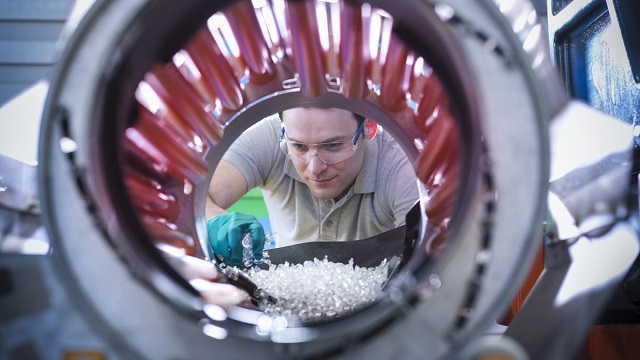Alberta
How natural gas supports one of Canada’s largest manufacturing sectors

Worker inspecting parts from plastic injection moulding machine in plastics factory. Getty Images photo
From the Canadian Energy Centre
‘When you think about the demand for more sustainable outcomes: clean air, clean water, clean energy, safe, nutritious, abundant food and electric vehicles, that’s more and more and more chemistry’
Canada’s chemical industry sold a record $72.7 billion of product last year amid recovery from COVID-19 and strong consumer demand, according to the Chemistry Industry Association of Canada (CIAC).
Natural gas is a key input to the chemistry sector, the broad term that refers to manufacturing a myriad of products used in everyday items from plastics to agriculture and pharmaceuticals.
“Chemistry products go into 95 per cent of finished goods. It’s an important sector,” says CIAC president Bob Masterson.
“It’s a sector that can grow as long as we fancy improving our lives and building a better world for tomorrow.”
Chemicals in Canada
Canada’s chemistry industry is the country’s fourth largest manufacturing sector by value of sales after food ($147 billion), transportation equipment ($119 billion), and petroleum/coal products ($118 billion).
It is primarily centered in Ontario, Alberta and Quebec.
The CIAC publishes an annual report on the sector’s activity using Statistics Canada data, separated into two categories: chemicals overall, and industrial chemicals.
Chemicals overall includes manufacturing of soaps, cleaning compounds, paints, coatings and adhesives, pesticides and fertilizers, pharmaceuticals, rubbers and synthetic fibres, and basic chemicals.
Industrial chemicals refers to the manufacturing of intermediate products used as inputs by industries including plastic and rubber products, forest products, transportation equipment, clothing, perfume and cosmetics, construction and pharmaceuticals.
Global Growth
According to Vantage Market Research, the global chemical market was valued at US$584 billion in 2022. It’s expected to grow by more than 55 per cent in the coming years to reach US$917 billion by 2030.
This isn’t just driven population growth, Masterson says.
“When you think about the demand for more sustainable outcomes: clean air, clean water, clean energy, safe, nutritious, abundant food and electric vehicles, that’s more and more and more chemistry,” he says.
“Some of the predictions are that the volumes of chemistry will double in the next 20 years. Canada and Alberta in particular are exceptionally well positioned to help meet future market demand for these products. The demand is not going away. There’s no question about that.”
Jobs
In 2022, Canada’s chemicals sector directly employed 90,800 people, or approximately the population size of Sudbury, Ontario. The industry paid about $7 billion in salary and wages.
That’s the direct impact of employment in the chemistry sector, but the CIAC estimates the full benefit to Canadians to be much higher as a result of indirect economic activity it supports.
CIAC estimates that every job in Canada’s chemistry sector creates another five indirect jobs in other parts of the economy. This means the sector supported 454,000 jobs across Canada in 2022.
Industrial chemicals alone directly employed 17,100 people and indirectly supported 85,600 jobs in the broader Canadian economy last year, the CIAC says.
Rising Trade
At a value of $72.7 billion, Canada’s overall chemical industry sales were their highest ever in 2022 – a 30 per cent increase compared to 2019, prior to the COVID-19 pandemic.
Industrial chemicals sales reached a record $34.2 billion, a 32 per cent increase compared to 2019.
Exports also increased last year, rising to a value of $52.8 billion compared to $45.9 billion in 2021. Of that, the sector exported $24.8 billion of industrial chemicals, up from $22.5 billion the previous year.
The United States is Canada’s main customer for chemical exports, representing 76 per cent of exports or $40.1 billion in 2022. The next largest export markets are China ($1.86 billion), the Netherlands ($1.7 billion), and the United Kingdom ($1.1 billion).
The Canada Advantage
Canada has distinct advantages as a chemical manufacturer and exporter including growing access to global markets, CIAC says.
In Alberta, the main advantage is access to low-cost natural gas resources – specifically valuable natural gas liquids like ethane, propane and butane.
“The rich abundance of natural gas liquids that come out of the ground when we drill for natural gas let Alberta be a low-cost chemistry producer despite being pretty much the only large chemistry industry worldwide that’s not on tidewater,” Masterson says.
Responsible Care
Since 1985, Canada’s chemistry industry has operated under an initiative called Responsible Care that encourages companies to innovate for safer and greener products.
CIAC reports that Responsible Care is now practiced in 73 countries and by 96 of the 100 largest chemical producers in the world.
Since 2005, CIAC members have reduced CO2 equivalent emissions by 13 per cent; reduced sulphur dioxide emissions by 94 per cent, and virtually eliminated large scale safety incidents. Since 2012, CIAC members have also reduced net water consumption by 13 per cent.
“We’re not standing in place,” Masterson says.
Alberta
Official statement from Premier Danielle Smith and Energy Minister Brian Jean on the start-up of the Trans Mountain Pipeline

Alberta
Protecting the right to vote for Canadian citizens: Minister McIver

Minister of Municipal Affairs Ric McIver issued the following statement in response to Calgary City Council’s vote to extend the right to vote to permanent residents:
“Yesterday, Calgary city council passed a motion advocating for permanent residents to be extended the right to vote in civic elections. Alberta’s government has been clear since the beginning: only Canadian citizens are able to vote in civic elections. That will not be changing.
“The Canadian Charter of Rights and Freedoms affirms the right of every Canadian citizen to vote and to run as a candidate. This right extends to voters in municipal, provincial and federal elections.
“Protecting our democracy is of the utmost importance. Our provincial election legislation, like the Local Authorities Elections Act, has also been clear since its inception that voting is a right of Canadian citizens.
“Alberta’s government is also ensuring that voting is accessible for more Albertans. The Municipal Affairs Statutes Amendment Act proposes to enable special ballot access for any voter who requests it, without having to provide any specific reason such as physical disability, absence from the municipality or working for the municipal election. The ministries of Seniors, Community and Social Services and Service Alberta and Red Tape Reduction are also making it easier for individuals to obtain the identification Albertans need for a variety of services, including the ability to cast a ballot.
“Our government will continue to protect the integrity of our elections and make sure voting is accessible for all Albertans who are Canadian citizens.”
-

 Uncategorized2 days ago
Uncategorized2 days agoMaking Alberta a geothermal energy leader
-

 Alberta2 days ago
Alberta2 days agoThree Calgary massage parlours linked to human trafficking investigation
-

 Alberta1 day ago
Alberta1 day agoAlberta’s vision for passenger rail
-

 John Stossel2 days ago
John Stossel2 days agoWhy Biden’s Just Wrong: NO ONE “Knows How to Make Government Work.”
-

 COVID-191 day ago
COVID-191 day agoStates move to oppose WHO’s ‘pandemic treaty,’ assert states’ rights
-

 Business1 day ago
Business1 day agoParliamentary Budget Officer forecasts bigger deficits for years to come
-

 Addictions1 day ago
Addictions1 day agoMust Watch: Addiction worker estimates 90% of “safer supply” drugs resold on black market
-

 conflict1 day ago
conflict1 day agoColumbia on Lockdown After pro-Palestinian Protesters Take Over Building, Hold Janitors Hostage






